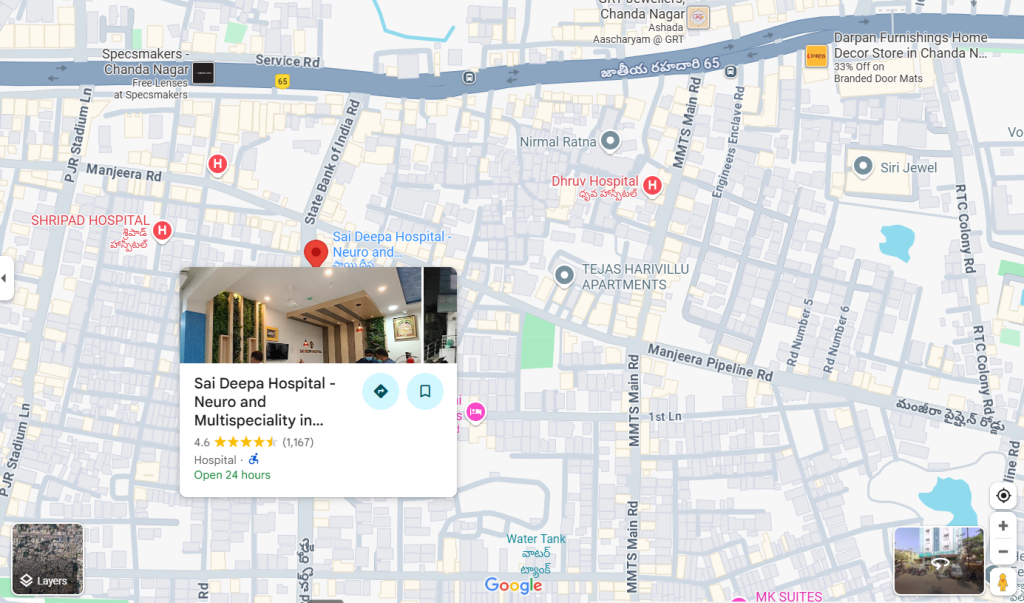Best Inguinal Hernia Surgery in Hyderabad
- Home
- Best Inguinal Hernia Surgery in Hyderabad
Best Inguinal Hernia Surgery in Hyderabad
Inguinal hernia is one of the most common types of hernias seen in both adults and children. It occurs when tissue, such as part of the intestine or fatty tissue, protrudes through a weak spot in the abdominal wall in the groin area. While many patients initially ignore mild discomfort, untreated inguinal hernias can lead to serious complications. This blog aims to explain inguinal hernia in detail, address frequently asked questions, and highlight treatment options available at modern hospitals, including advanced surgical techniques.
Book Free Appointment
1L+
Happy Customers
25+
Qualified Doctors
50
Rooms
5000+
Successful Surgeries
Free
Consultation
24/7 Ambulance
Facility
Insurance
Claim Support
What is an Inguinal Hernia?
An inguinal hernia happens when tissue pushes through a weak spot in the abdominal muscles, appearing as a visible or palpable bulge in the groin. This bulge is usually more noticeable when standing, coughing, or straining. It can occur on either side of the groin, and sometimes, both sides may be affected (bilateral inguinal hernia).
Unlike some other conditions, an inguinal hernia does not resolve on its own. Medical evaluation is always recommended.

Dr. Sasidhara Roa A
MBBS, MS
5000+ Successful Surgeries
11+ Years of experience
Dr. Sasidhara Rao A. is an experienced General and Laparoscopic Surgeon at Sree Sai Deepa Hospitals, Chandanagar, with over 11 years of expertise and 5000+ successful surgeries. He specializes in laparoscopic, laser, and microscopic surgeries, treating conditions like piles, fissures, varicose veins, and gallbladder issues.
Doctor’s Fellowships:
Fellowship - International Society of Coloproctology
Fellowship in Intimate Health
Fellowship in Diagnostic Endoscopy
Difference Between Direct and Indirect Inguinal Hernia
There are two main types of inguinal hernia:
Direct Inguinal Hernia: This type occurs due to a weakness in the abdominal wall that develops over time, often as a result of aging, heavy lifting, or repeated straining. It is more common in adults.
Indirect Inguinal Hernia: This type is usually congenital, meaning it is present from birth due to an opening in the abdominal wall that fails to close properly. It is the most common type found in children and younger adults.
Understanding the difference is important because it helps doctors determine the best treatment approach.
Who Does an Inguinal Hernia Affect?
An inguinal hernia can affect both men and women, but it is far more common in men. Risk factors include:
Male gender (men are 8–10 times more likely than women to develop inguinal hernias)
Family history of hernias
Chronic cough or constipation
Obesity or being overweight
Previous abdominal surgeries
Premature birth or low birth weight (in children)
Frequent heavy lifting or strenuous physical activity
How Common Are Inguinal Hernias?
Inguinal hernia is one of the most common hernia types worldwide. Studies suggest that approximately 25% of men and 2% of women will develop an inguinal hernia at some point in their lifetime. In children, an indirect inguinal hernia is among the most frequent surgical conditions.
Get your surgery cost
What are the Symptoms of an Inguinal Hernia?
The most common symptoms include:
A noticeable bulge in the groin or scrotum
Pain or discomfort, especially when coughing, bending, or lifting
Heaviness or dragging sensation in the groin
Burning, gurgling, or aching sensation at the bulge site
In severe cases, nausea, vomiting, and inability to pass stools (possible signs of strangulation)
Some small hernias may not cause pain initially but can still progress over time.
What are the Main Causes of an Inguinal Hernia?
The primary cause is a weakness in the abdominal wall. This weakness can be congenital (present from birth) or acquired over time due to factors like:
Aging and muscle weakness
Chronic straining from constipation, urination difficulties, or coughing
Pregnancy, which increases abdominal pressure
Heavy lifting without proper technique
Obesity, which strains abdominal muscles
Accreditations

Saideepaneurocare Hospitals is NABH certified, a mark of excellence in patient safety and care. We follow stringent healthcare protocols and maintain world-class hygiene standards.

We are ISO 9001 certified, ensuring the highest standards in quality management and patient care. This certification reflects our commitment to efficient processes and continuous improvement in healthcare services.
What Should You Do If You Suspect an Inguinal Hernia?
If you or your child develops a bulge in the groin area or experiences discomfort, seek medical attention promptly. Early evaluation by a general surgeon ensures timely diagnosis and prevents complications such as strangulation, where part of the intestine gets trapped and the blood supply is cut off.
How is an inguinal hernia diagnosed?
Doctors usually diagnose an inguinal hernia through:
Physical Examination – A bulge becomes more prominent when coughing or standing.
Imaging Tests – Ultrasound, CT scan, or MRI may be used if the hernia is small or difficult to detect.
What is the best treatment for inguinal hernia?
Currently, surgery is the only permanent treatment for inguinal hernia. Unlike some other conditions, hernias do not heal on their own. Treatment options include:
Open Hernia Repair (Herniorrhaphy/Hernioplasty): The surgeon makes an incision in the groin, pushes the protruding tissue back, and strengthens the abdominal wall using sutures or mesh.
Laparoscopic Hernia Repair: A minimally invasive approach where surgeons use small incisions, a camera, and specialized instruments. This method offers quicker recovery, less pain, and minimal scarring.
Sai Deepa Hospital - Neuro and Multispeciality
Plot no 387, Church road, Huda colony, Chanda Nagar, Hyderabad – 500050
What Happens if an Inguinal Hernia is Left Untreated?
If ignored, an inguinal hernia may worsen and cause complications such as:
- Incarceration: The hernia gets stuck and cannot be pushed back.
- Strangulation: Blood supply to the trapped tissue is cut off, leading to tissue death, severe pain, and life-threatening complications.
What Are the Surgical Options for Varicocele?
- Open Surgery with Mesh Repair:
This is the traditional and most widely performed technique.
In this method, the surgeon makes an incision in the groin area, pushes the hernia back into place, and reinforces the weakened muscle wall using a synthetic mesh.
The mesh provides long-term support, reduces the chances of recurrence, and has been proven effective in millions of cases worldwide.
Although recovery may take slightly longer compared to minimally invasive methods, it remains the gold standard for large or complicated hernias. - Laparoscopic Repair (Keyhole Surgery):
This minimally invasive approach uses small incisions through which a tiny camera and instruments are inserted.
The surgeon repairs the hernia from inside the abdominal wall with the help of a mesh. Patients usually experience less post-operative pain, faster recovery, and can return to daily activities sooner.
Laparoscopic surgery is especially suitable for those who have bilateral hernias (on both sides) or recurrent hernias after open surgery. - Robotic-Assisted Surgery:
A newer and advanced technique, robotic hernia repair provides surgeons with enhanced precision, 3D visualization, and better control of instruments.
This method allows delicate movements that are difficult to achieve with traditional laparoscopy.
Patients benefit from smaller scars, reduced pain, and quicker healing.
Though not available in all hospitals, it is becoming increasingly popular in modern multispeciality hospitals.
Which is the Best Hospital for inguinal hernia Surgery in Hyderabad
An inguinal hernia is a common yet serious condition that requires medical attention. Early diagnosis and timely surgery prevent complications and restore quality of life. At Sai Deepa Hospital, Chanda Nagar, our team of experienced general surgeons provides advanced treatment options, including minimally invasive laparoscopic hernia repair, ensuring safe and faster recovery.
Let us help you live pain-free with expert treatment and compassionate care
Where to get the best inguinal hernia Surgery in Chandanagar, Hyderabad?
📍 Sai Deepa Hospitals, Chanda Nagar, Hyderabad
📞 Call or WhatsApp: +91-7093762716
🌐 www.saideepaneurocare.com
Best inguinal hernia Treatment Doctor in Chandanagar | Best inguinal hernia Treatment Doctor in Miyapur | Best inguinal hernia Treatment Doctor in Kukatpally | Best inguinal hernia Surgery Doctor in Hyderabad
Patient Reviews



FAQ's on inguinal hernia
1. How to cure inguinal hernia without surgery?
Unfortunately, an inguinal hernia cannot be cured without surgery. Supportive measures like hernia belts may temporarily ease discomfort, but do not treat the root cause.
2. What is the main cause of an inguinal hernia?
Weakness in the abdominal wall, combined with pressure from activities such as heavy lifting or chronic coughing, is the main cause.
3. Can you live with an inguinal hernia?
Some patients live with small, painless hernias for years. However, risks of incarceration or strangulation always exist, so surgery is recommended.
4. What happens if an inguinal hernia is left untreated?
It may enlarge over time and lead to severe complications like intestinal blockage or strangulation, which require emergency surgery.
5. What is the recovery time for an inguinal hernia?
Recovery usually takes 1–2 weeks for daily activities and 4–6 weeks for strenuous activities after surgery. Minimally invasive surgery offers quicker healing.
6. How to prevent an inguinal hernia from getting worse?
Avoid heavy lifting, maintain a healthy weight, manage chronic cough or constipation, and wear supportive garments only under a doctor’s advice.


